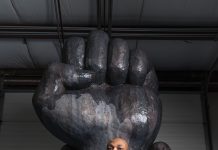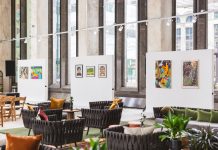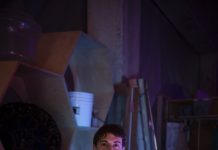
Akeem Smith: No Gyal Can Test is a ghost dance. This multimedia exhibition at Red Bull Arts Detroit explores the fashion, music, and surroundings of 1980s/1990s street dances in Kingston, Jamaica, through archival photos and VHS videos of dancehall reggae events along with custom, impressionistic mannequins and architectural sculptures built from demolished materials gathered in the city.
It looks like you’re walking through the remnants of a long-ago party whose remains include color-washed grainy video, dilapidated buildings, and forgotten fashions. But these are specters of celebration, wraiths of youth, and creativity, not broken-down spirits.
Perhaps the closest Detroit analogs to a Kingston street dance from the same era would be a techno show at an abandoned warehouse or beat-up club, or perhaps the TV program The New Dance Show — despite being in less-than-fancy environments, they’re situations where people got dressed all the way up to boogie all the way down. In both Detroit and Jamaica, women especially helped define the aesthetics of these music scenes.
“With the visual aesthetics there are a lot of style parallels with women in Detroit,” says Smith, who lives in Brooklyn but was raised between New York City and Jamaica. “Detroit and Jamaica have a lot of Eurocentric beauty ideals but they’re very site-specifically Black.”
No Gyal Can Test shows these Black women owning the street dances through their sexuality and what Smith calls the “ghetto fabulous” look, featuring fancy hairdos and loud, tight, revealing clothes, often designed or modified by the dancers — or even members of his own family who founded the Ouch Crew fashion collective, whose designs were worn by dancehall reggae stars Lady Saw and Beenie Man.

Smith, who is primarily known as a stylist and fashion designer, makes the leap to installation artist with ease: For No Gyal Can Test, Smith has basically dressed a throwback Kingston street scene from the time when he was born in 1991.
Like Detroit, Kingston has suffered economically for decades, and the infrastructure in both places has been hit hard. But in the midst of all that neglect, these majority Black cities have continued to produce culture that influences the world. Like the working-class mods in 1960s England who dressed in sharp suits that belied their economic status, many patrons at ’90s dancehall parties dressed up in extravagant, colorful fashions that conveyed a distinctly uptown outlook through a Black perspective. “With people of color, we’re obsessed with upward mobility and, for the most part, constantly trying to exponentially grow our economic status,” Smith says.
Despite dancehall reggae being dominated by male artists, No Gyal Can Test displays how the female dancers and creatives in the scene were “the nucleus of the whole thing. This is what really gives the energy to the music,” Smith says. The exhibition’s title is Jamaican patois for “no girl is better than me,” and the phrase “no gyal can test” was a brag written on the back of a photograph from a female admirer that Smith found among his father’s belongings.
While the Detroit area doesn’t have a large Caribbean community like New York City, where No Gyal Can Test made its debut last year, that suits Smith just fine. “The show isn’t just for Caribbean people to come and see themselves,” he says. “The show is more about the visual aesthetics of people of the Caribbean. The show has a theme of memory and joy. The women act as my reliquaries.”
Through July 30. Red Bull Arts Detroit, 1551 Winder St.; redbullarts.com
|
|
|









